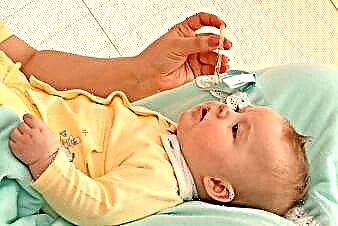What drops in the ears during pregnancy will not harm the unborn baby and can they be used at all? I am glad that more and more expectant mothers do not use medicines thoughtlessly, but ask themselves and the doctors this question. Pregnancy is a special period in which a woman thinks and cares primarily not about herself, but about her unborn child. But even at this time, you can catch a cold and catch a runny nose, which often results in otitis media. It is imperative to be treated, but it is better to do it with proven folk remedies or drops that do not contain antibiotics.
Diagnosis - otitis media
 The most difficult situation during pregnancy is otitis media. Usually, inflammation of the middle or inner ear develops under the influence of pathogenic microorganisms, which are very difficult to cope with without antimicrobial drugs. And the pain in otitis media is the most acute, comparable to a toothache. It is very exhausting and can lead to a rise in body temperature.
The most difficult situation during pregnancy is otitis media. Usually, inflammation of the middle or inner ear develops under the influence of pathogenic microorganisms, which are very difficult to cope with without antimicrobial drugs. And the pain in otitis media is the most acute, comparable to a toothache. It is very exhausting and can lead to a rise in body temperature.
But just ear drops during pregnancy with an antibiotic cannot be used. In addition, with great care it is necessary to use popular vasoconstrictor drugs, which are also often prescribed in the treatment of otitis media. Most of the effective pain relievers cannot be used either. So what is left?
In principle, among the not too wide selection of drugs that can be dripped into the ear of a pregnant woman, only three drugs are the safest:
- Otipax. Contains lidocaine, but in small quantities. The composition of the drops is selected so that they have an exclusively local effect and do not penetrate the placental barrier. It relieves pain well, but does not cope with severe inflammation, therefore it can be effectively used only at the initial stage of the disease. Do not use if there is a tear of the tympanic membrane. In some cases, it causes allergies.
 "Otofa". For the treatment of pregnant women, it is used in cases where there is a perforation of the eardrum and severe inflammation that could not be removed by other methods. Contains a weak antibiotic - rifamycin, capable of killing most pathogenic microorganisms. The drug very quickly relieves inflammation, but does not contain analgesic components. Therefore, the pain does not go away immediately, but only as you recover.
"Otofa". For the treatment of pregnant women, it is used in cases where there is a perforation of the eardrum and severe inflammation that could not be removed by other methods. Contains a weak antibiotic - rifamycin, capable of killing most pathogenic microorganisms. The drug very quickly relieves inflammation, but does not contain analgesic components. Therefore, the pain does not go away immediately, but only as you recover.- Tsipromed is a powerful new generation antibacterial drug that easily relieves inflammation and is harmful to most fungal and bacteria. It is used in the treatment of acute, purulent and chronic otitis media. The percentage of the drug that enters the bloodstream is extremely insignificant, therefore it is prescribed during pregnancy in cases where the benefits significantly outweigh the risks. It is categorically impossible to use without a doctor's prescription!
Often, severe ear pain is a signal of the onset of other, more serious diseases. Therefore, it is very important to immediately seek the advice of a doctor and not try to treat it yourself without finding out exactly the reason.
Sulfur plug
 Sometimes a common earwax plug causes severe pain in the ear. When water enters the ear, it swells and begins to press on the eardrum. In this case, a 3% solution of hydrogen peroxide or "Remo-Wax" - absolutely safe ear drops for pregnant women and young children will help to quickly solve the problem.
Sometimes a common earwax plug causes severe pain in the ear. When water enters the ear, it swells and begins to press on the eardrum. In this case, a 3% solution of hydrogen peroxide or "Remo-Wax" - absolutely safe ear drops for pregnant women and young children will help to quickly solve the problem.
The structure of "Remo-Wax" includes:
- mink oil as a base;
- softening component lanolin;
- anti-inflammatory allantoin;
- exfoliating sorbic acid.
There are no antibiotics in these drops. They simply soften the sulfur plug, it stops pressing on the eardrum, and the sulfur gradually comes out through the ear canal.
Alternative remedies
If ear pain is caused by a runny nose or a cold, then you can try to cope with it at home with simple folk remedies:
 drip 5-6 drops of boric alcohol into the sore ear and lay with a cotton swab;
drip 5-6 drops of boric alcohol into the sore ear and lay with a cotton swab;- soak a gauze turunda with camphor oil and insert into the ear;
- drip your ears with warm nut oil and make a dry cotton compress;
- wrap grated onions or garlic in cheesecloth and put in a sore ear;
- 2-3 times a day, drip the ears with alcohol tincture of propolis.
If the pain persists within 1-2 days or begins to intensify, you need to go to the hospital. Purulent otitis media during pregnancy is very difficult to cure. In addition, it is dangerous for the unborn child, as it increases the intoxication of the mother's body.

 "Otofa". For the treatment of pregnant women, it is used in cases where there is a perforation of the eardrum and severe inflammation that could not be removed by other methods. Contains a weak antibiotic - rifamycin, capable of killing most pathogenic microorganisms. The drug very quickly relieves inflammation, but does not contain analgesic components. Therefore, the pain does not go away immediately, but only as you recover.
"Otofa". For the treatment of pregnant women, it is used in cases where there is a perforation of the eardrum and severe inflammation that could not be removed by other methods. Contains a weak antibiotic - rifamycin, capable of killing most pathogenic microorganisms. The drug very quickly relieves inflammation, but does not contain analgesic components. Therefore, the pain does not go away immediately, but only as you recover. drip 5-6 drops of boric alcohol into the sore ear and lay with a cotton swab;
drip 5-6 drops of boric alcohol into the sore ear and lay with a cotton swab;

